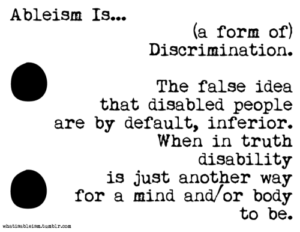What is ableism?

Based on the belief that disability is a defect rather than a dimension of human diversity, ableism affects those with disabilities by inhibiting their access to and power within institutional structures that fulfill needs, like health care, employment, housing, government, education, religion, the media, and the legal system.
“Ideologies and practices that belittle and/or limit people with disabilities arise from ableist attitudes. Ableist attitudes are those that reflect a fear of, and aversion to, or discrimination or prejudice against people with disabilities. They can be as blatant as a refusal to hire someone with an apparent disability, or as subtle as the assumption that everyone attending a concert can stand for two hours. Like racism, sexism, or homophobia, ableism is directed at individuals and built into social structures; it is lived out purposefully, accidentally, and unknowingly. Ableist ideologies shape our media, for example, when people with disabilities are either completely absent or portrayed only as tragic and sad figures. They permeate our dominant standards of beauty and sexiness, definitions of what it means to dance, and measures of healthfulness. They also shape our expectations for leadership and success.”“Human variability is immense. We see and hear in varying degrees, our limbs are of different lengths and strengths, our minds process information differently, we communicate using different methods and speeds, we move from place to place via diverse methods, and our eye colors are not the same. Some of us can soothe children, some have spiritual insight, and some discern the emotions of others with astounding skill. Which bodily and mental variabilities are considered inconsequential, which are charming, and which are stigmatized, changes over time—and that is the history of disability.”
from A Disability History of the United States, by Kim E. Nielsen. Boston: Beacon Press, 2012, pp. xvi-xvii.
Examples (and more Examples of Ableism in Society)
- ignoring someone’s disabilities, assuming disabilities play no role in shaping someone’s life experience, dismissing the lived experience of people with disabilities
- assuming someone’s disability is the only factor shaping their experience, that they have no other interests, or having nothing to contribute to the community
- being unaware of the accessibility of venues you choose, expecting disabled people will not be interested in or capable of participating, not providing and publicizing a mechanism for addressing access questions
- assuming that new technologies are accessible to all
- ignoring the fact that most social justice issues have a disproportionate impact on people with disabilities, ignoring social justice issues that primarily affect disabled people
Great Video from Rev. Theresa Soto!
External Links (We love wheels, but not re-inventing them)
for what ableism is, ways to unlearn it, check out What is Ableism? Also, their links page is a great resource
for why words matter, check out this post on Linguistic Ableism and it’s companion glossary of ableist phrases both from Lydia X.Z. Brown
for reflection, a powerful poem by Maria R. Palacios, Naming Ableism
